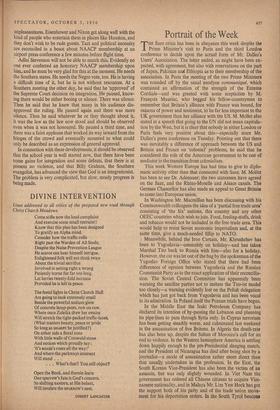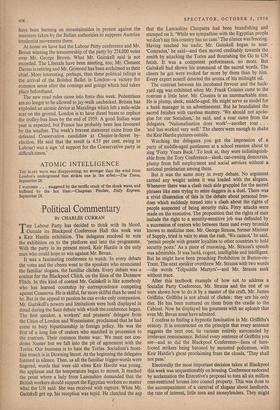Portrait of the Week
THE Suez crisis has been in abeyance this week despite the Prime Minister's visit to Paris and the third London conference to decide upon the actual form of Mr. Dulles's Users' Association. The latter ended, as might have been ex- pected, with agreement, but also with reservations on the part of Japan, Pakistan and Ethiopia as to their membership of the association. In Paris the meeting of the two Prime Ministers was rounded off by the usual anodyne communiqué, which contained an affirmation of the strength of the Entente Cordiale—and was greeted with some scepticism by M. Francois Mauriac, who begged his fellow-countrymen to remember that Britain's alliance with France was bound, for reasons of power and sentiment, to be far less important to the UK government than her alliance with the US. M. Mollet also stated in a speech that going to the UN did not mean capitula- tion by the West, but it is clear that nobody in either London or Paris feels very positive about this—especially since Mr. Dulles's press conference on Tuesday. Pointing out that there was inevitably a difference of approach between the US and Britain and France on 'colonial' problems, he said that he considered the role of the American government to be one of mediator in the transition from colonialism.
This week Western Europe has had time to give to diplo- matic activity other than that connected with Suez. M. Mollet has been to see Dr. Adenauer; the two statesmen have agreed on the Saar, and the Rhine-Moselle and Alsace canals. The German Chancellor has also made an appeal to Great Britain to come into European union.
In Washington Mr. Macmillan has been discussing with his Commonwealth colleagues the idea of a 'partial free trade area' consisting of 'the Six' nations, this country and any other OEEC countries which wish to join. Food, feeding-stuffs, drink and tobacco would not be included in the free trade area. This would help to resist Soviet economic imperialism and, at the same time, give a much-needed fillip to NATO.
Meanwhile, behind the Iron Curtain, Mr. Khrushchev has been to Yugoslavia—ostensibly on holiday—and has taken Marshal Tito back to Russia with him—also for a holiday. However, the cat was let out of the bag by the spokesman of the Yugoslav Foreign Office who stated that there had been differences of opinion between Yugoslavia and the Russian Communist Party as to the exact application of their reconcilia- tion. The Soviet Central Committee has apparently been warning the satellite parties not to imitate the Tito-ist model too closely—a warning evidently lost on the Polish delegation which has just got back from Yugoslavia and has been vocal in its admiration. In Poland itself the Poznan trials have begun.
In the Middle East the lraki Petroleum Company has declared its intention of by-passing the Lebanon and planning its pipe-lines to pass through Syria only. In Cyprus terrorism has been getting steadily worse, and culminated last weekend in the assassination of five Britons. In Algeria the death-rate has also been up, despite the Sultan of Morocco's call for an end to violence. In the Western hemisphere America is settling down happily enough to the pre-Presidential slanging match, and the President of Nicaragua has died after being shot by a journalist—a mode of assassination rather more direct than that usually undertaken in the profession. In the East, the South Korean Vice-President has also been the victim of an assassin, but was only slightly wounded. In Viet Nam the government has ordered all Chinese citizens to acquire Viet- namese nationality, and in Malaya Mr. Lim Yew Hock has got the support both of his party and of the trade union move- ment for his deportation orders. In the South Tyrol beacons have been burning on mountainsides in protest against the measures taken by the Italian authorities to suppress Austrian irredentist movements there.
At home we have had the Labour Party conference and Mr. Bevan winning the treasurership of the party by 274,000 votes over Mr. George Brown. What Mr. Gaitskell said is not recorded. The Liberals have been meeting, too; Mr. Clement Davies is retiring and Mr. Grimond has been acclaimed as their chief. More interesting, perhaps, than these political tidings is the arrival of the Bolshoi Ballet in London—a victory for common sense after the comings and goings which had taken place beforehand.
The new road rules came into force this week. Pedestrians are no longer to be allowed to jay-walk unchecked. Britain has exploded an atomic device at Maralinga which left a mile-wide scar on the ground. London is to have diesel buses to replace the trolley-bus lines by the end of 1959. A good Italian wine year is expected, but France has probably been less favoured by the weather. The week's bravest statement came from the defeated Conservative candidate at Chester-le-Street by- election. He said that the result (a 4.53 per cent. swing to Labour) was a sign 'of support for the Conservative party in difficult times.'



















































 Previous page
Previous page